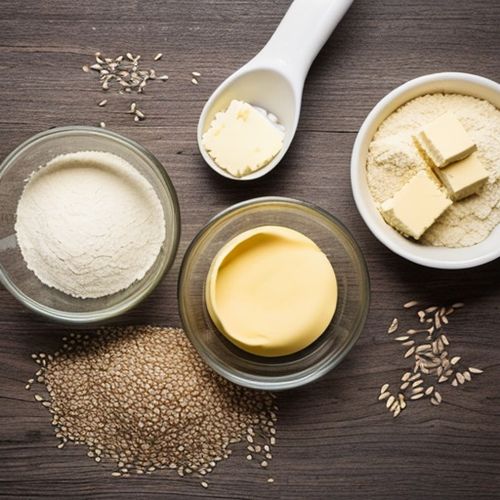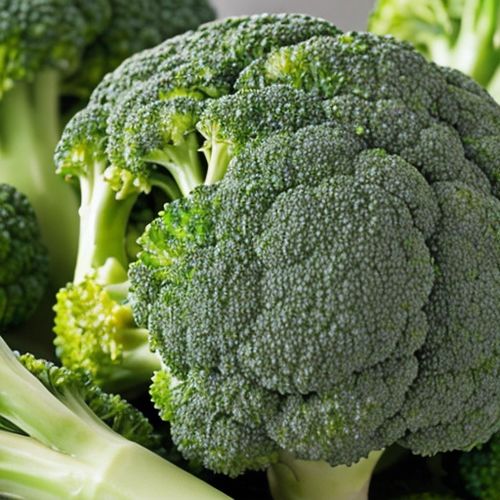Broccoli, a cruciferous vegetable, has long been celebrated for its numerous health benefits. Rich in vitamins, minerals, and bioactive compounds, broccoli has been linked to reduced risks of chronic diseases, improved metabolic health, and enhanced overall well-being. Recent studies have further illuminated the potential of broccoli to support health in various ways, from diabetes management to cancer prevention. Let's explore the latest findings on the health benefits of this remarkable vegetable.
1. Antioxidant and Anti-inflammatory Properties
Broccoli is a powerhouse of bioactive compounds, including phenolic compounds and isothiocyanates such as sulforaphane (SF). These compounds are responsible for the vegetable's antioxidant and antimicrobial properties. Sulforaphane, in particular, has been shown to regulate the cell cycle, induce apoptosis, and modulate enzymatic activity, thereby reducing the risk of chronic diseases. Recent research has also highlighted the significant antioxidant capacity of broccoli by-products, such as leaves and stems. Methanol extracts from these parts have demonstrated high antioxidant activity, primarily due to their rich polyphenol content.
2. Cancer Prevention
One of the most well-known benefits of broccoli is its potential to prevent cancer. The presence of sulforaphane and other isothiocyanates in broccoli has been linked to chemopreventive properties. These compounds can inhibit the activity of enzymes that activate carcinogens and induce the activity of enzymes that detoxify and eliminate carcinogens. Recent studies have further explored the mechanisms by which broccoli extracts can modulate the activity of immune cells involved in inflammation, such as macrophages and lymphocytes, thereby reducing the risk of cancer.
3. Diabetes Management
A groundbreaking study published in *Nature Microbiology* has shown that broccoli could play a significant role in reducing the risk of type 2 diabetes. Researchers from the University of Gothenburg found that participants taking sulforaphane, a compound naturally found in broccoli, experienced a higher average reduction in fasting blood sugar compared to those taking a placebo. The study included 89 individuals with elevated fasting blood sugar, an indicator of prediabetes. The results were particularly significant in subgroups with early signs of mild age-related diabetes, low BMI, low insulin resistance, and low incidence of fatty liver disease. This research highlights the potential of broccoli as a functional food in managing diabetes and supports the growing trend of using food as medicine.
4. Cardiovascular Health
Broccoli's impact on cardiovascular health is another area of active research. The bioactive compounds in broccoli have been shown to improve blood vessel function, reduce inflammation, and lower cholesterol levels. Recent studies have also explored the role of gut microbiota in processing sulforaphane, suggesting that the interaction between these compounds and gut bacteria could further enhance broccoli's cardiovascular benefits.
5. Gut Health and Metabolic Health
Broccoli has been shown to positively influence gut health and metabolic health. Dietary supplementation with broccoli has been found to improve glucose tolerance, attenuate liver inflammation, and alter microbial composition in mice fed high-fat diets. The inclusion of broccoli by-products, such as leaves and stems, in the diet has also been shown to enhance lipid parameters, insulin sensitivity, and gut microbiome diversity. These findings suggest that broccoli could be a valuable addition to diets aimed at managing obesity and metabolic syndrome.
6. Incorporating Broccoli into the Diet
Given its numerous health benefits, incorporating broccoli into the diet is a smart choice. Recent studies have explored various ways to maximize the bioavailability of broccoli's bioactive compounds. For example, broccoli sprouts and leaves have been shown to be particularly rich in sulforaphane and other beneficial compounds. Additionally, broccoli by-products, such as leaves and stems, can be used in food formulations to enhance the nutritional value of various products. For instance, broccoli leaf powder has been successfully incorporated into wheat pasta, noodles, and gluten-free bread, significantly increasing their protein, fiber, and antioxidant content.
The latest research on broccoli highlights its incredible potential to support overall health through its antioxidant, anti-inflammatory, and metabolic benefits. From reducing the risk of type 2 diabetes to preventing cancer and improving cardiovascular health, broccoli is a versatile and powerful addition to any diet. As scientists continue to uncover more about the mechanisms behind these benefits, incorporating broccoli into a balanced diet remains a delicious and effective way to promote health and well-being. Whether consumed fresh, in supplements, or incorporated into various food products, broccoli is truly a superfood worth including in your daily meals.

By Olivia Reed/Apr 24, 2025

By Victoria Gonzalez/Apr 24, 2025

By Sophia Lewis/Apr 24, 2025

By William Miller/Apr 24, 2025

By Olivia Reed/Apr 24, 2025

By Laura Wilson/Apr 24, 2025

By Victoria Gonzalez/Apr 24, 2025

By Natalie Campbell/Apr 24, 2025

By Jessica Lee/Apr 24, 2025

By Rebecca Stewart/Apr 24, 2025

By George Bailey/Apr 24, 2025

By Elizabeth Taylor/Apr 24, 2025

By Thomas Roberts/Apr 24, 2025

By Laura Wilson/Apr 24, 2025

By Samuel Cooper/Apr 24, 2025

By Lily Simpson/Jan 13, 2025

By Christopher Harris/Dec 20, 2024

By Samuel Cooper/Dec 20, 2024